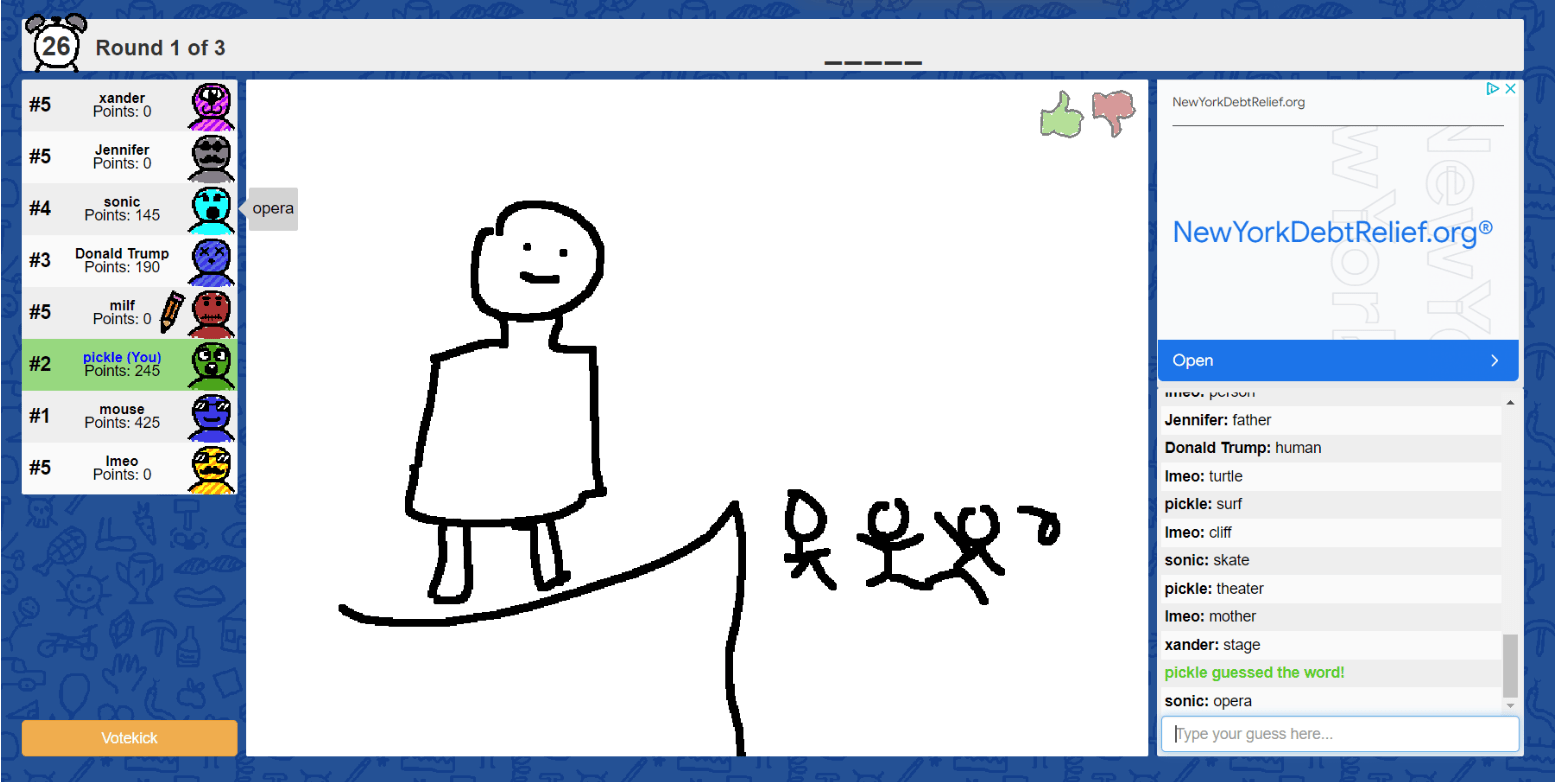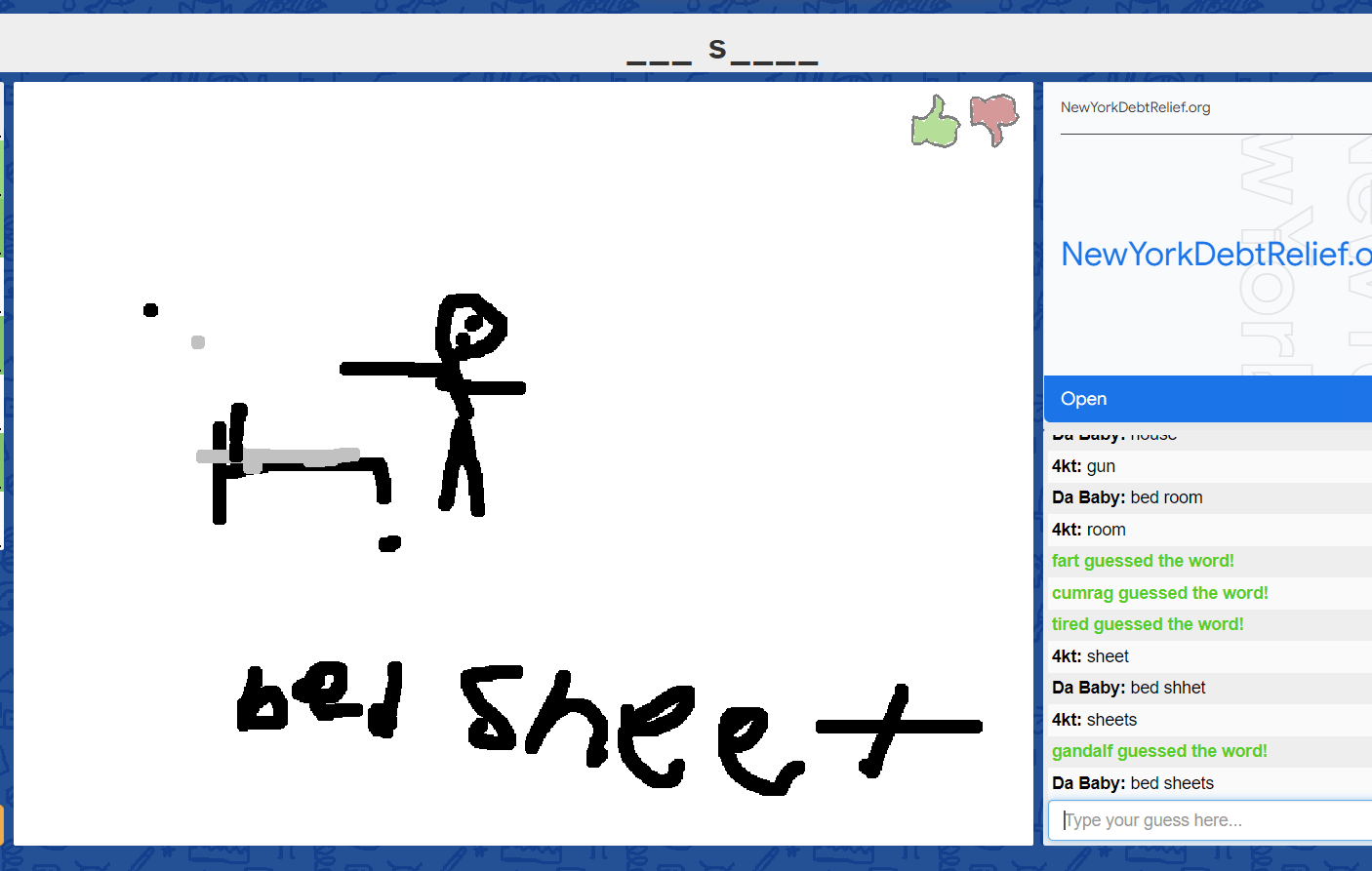Name of Game: Skribbl.io
Creator: @ticedev
Platform: Web Browser
Target Audience:
Skribbl.io has a very broad target audience. It can be played by close friends and strangers alike without losing any of the fun. The game does not require prior knowledge in any particular area in order to be able to understand the rules/procedures. I would argue that anyone who has access to a web browser, regardless of their background, could reasonably enjoy this game. I would also argue that people who have a lot of experience in drawing will likely perform better than most. I don’t think experienced drawers are the game’s target audience by design, but I could see Skribbl.io being especially popular among that demographic.
Formal Elements:
Skribbl.io can be played with as many as 12 players and as few as two players. The procedure of the game is very simple and easy to understand. There are three rounds in the game by default. In each round, each player gets a turn to draw once per round. In each turn of a round, one player chooses one word from a random list of three words. The player must then draw their chosen word in 80 seconds, such that the other players are able to guess what they are drawing. As per the rules of the game, drawers can use any drawing tools given to them: line width, pen colors, etc. Players who are guessing are able to guess anything that they can type into the textbox. The player who is drawing wants as many people as possible to guess their drawing because they earn points based on the number of correct guesses. The players who are not drawing want to guess what is being drawn as quickly as possible because they earn points based on the timing of a correct guess. The overall objective of the game is to get as many points as possible by the end of the three rounds. I would consider this an outwit objective in a zero-sum game because your goal is to either use what you know to guess before other players or to draw effectively based on what you know.

From my time playing, I was really interested in how Skribbl.io uses time as a resource. Players who are drawing are pressured to maximize their use of time to get across as much information in their drawing as possible. Players who are guessing are pressured to minimize their consumption of time to earn the most points per turn. These mechanics create the dynamic of constant rushing and panic which creates the aesthetic of challenge. Scribbl.io offers the fun of challenge via players’ struggle to effectively use time as a resource.
Scribbl.io is also fun through fellowship because many of the mechanics require you to depend on or race against other players. There is the multilateral competition of the drawer needing the other players to guess correctly and the other players needing to guess before each other. I believe that Scribbl.io is very successful in getting players to engage in repetitive positive interactions while building trust.
The game also provides fun through self expression as players have nearly unlimited control over how they choose to draw the word that they’ve chosen to draw.
The game works because it is simple, easy-to-understand, quick, and appeals to a wide audience. By not targeting a specific niche demographic, there are people of all ages and relations that enjoy playing Skribbl.io. It requires very little work for the players to enter the “magic circle” of play. They can play anywhere they have access to a web browser. They can play with strangers online and still have fun, so they don’t need to have close friends to play with. They don’t need any prior experience to be able to complete the objectives of the game. Overall, Skribbl.io does a great job in catering to nobody and appealing to everyone.
One area that I think Skribbl.io can improve in is its protections against abuse. Looking at the rules that are given by the game, it doesn’t say anywhere that players cannot use words in their drawings. However, in my time playing, I found that the challenge of guessing and drawing is undermined when a player simply writes out what the word is with minimal effort in drawing it. I think a very easy fix to this could be adding a line in the rules of the game that clarifies that writing words in their drawings is an action that players cannot take.

Building on the lack of protections against abuse, there is nothing that stops a player from drawing or guessing something that is explicit or offensive to other players. For example, in random lobbies, there are people who choose to draw phallic images rather than the word that they chose. There are people who guess slurs and other derogatory statements just to get a reaction from the other players guessing. This is a difficult problem to address, and we see these kinds of bad actors in many online spaces beyond games. While I don’t have a definitive solution, I think it would help if there was a clear code of conduct of how players should interact with each other. This helps set the game’s online culture intentionally, rather than letting it be decided by the players haphazardly. Moreover, there should be stricter moderation of what words players are allowed to say in the guessing chat. Alternatively, I wonder if the game would be better suited for solely friends and acquaintances, people who know each other prior to playing. Online play helped make Skribbl.io as popular as it is, but perhaps, the only way to properly protect players is by not allowing them to interact with random people with minimal filtration.
Comparison to Other Judging Games:
Skribbl.io is similar to the game Charades. Both of these games rely on a player performing an action (drawing or acting) while other players race to guess what prompt was given. A key difference between these games is that Charades is almost always played in person while Skribbl.io is always played remotely. I believe that allowing remote play lowers the amount of vulnerability required from players. It is much more embarrassing to have people looking directly at you when you struggle to act in Charades than it is to have people look at your questionable artwork from a distance in Skribbl.io. The choice of remote play in Skribbl.io is one reason the game works so well and can be enjoyed by people who don’t have strong ties.
Vulnerability in the Game:
Skribbl.io draws vulnerability out of its players in a very unique way compared to other social games. Many social games rely on the players themselves to generate vulnerability when they are prompted by the game. In this case, the player has control over providing the information or action that makes them vulnerable. It creates conflict within the player because, for example, most people won’t want to give all of the details of an experience that was really embarrassing for them. Skribbl.io avoids this conflict by requiring players to be vulnerable through an unavoidable action. While players can choose to withhold information when answering a prying question, they cannot choose to hide their ability to draw when actually forced to draw something in the game. Skribbl.io needs players to be vulnerable enough to share their drawings and demonstrate how well they can convey the prompt via drawing. While the player has less choice in how vulnerable they are in Skribbl.io, it feels less costly because there is less of an expectation for anyone to be amazing at drawing. From a design point of view, I believe that this works very well because Skribbl.io still achieves fun via fellowship while lowering the cost of entry (vulnerability) for players. During my own time playing, I found myself worrying about whether or not I could draw well enough for the other players to understand what I was going for. However, these initial concerns quickly faded when I saw everyone else drawing at around the same level as myself. Moreover, I felt closer to the players who were actually able to interpret my drawings. It was vulnerability that paid off and built trust!



